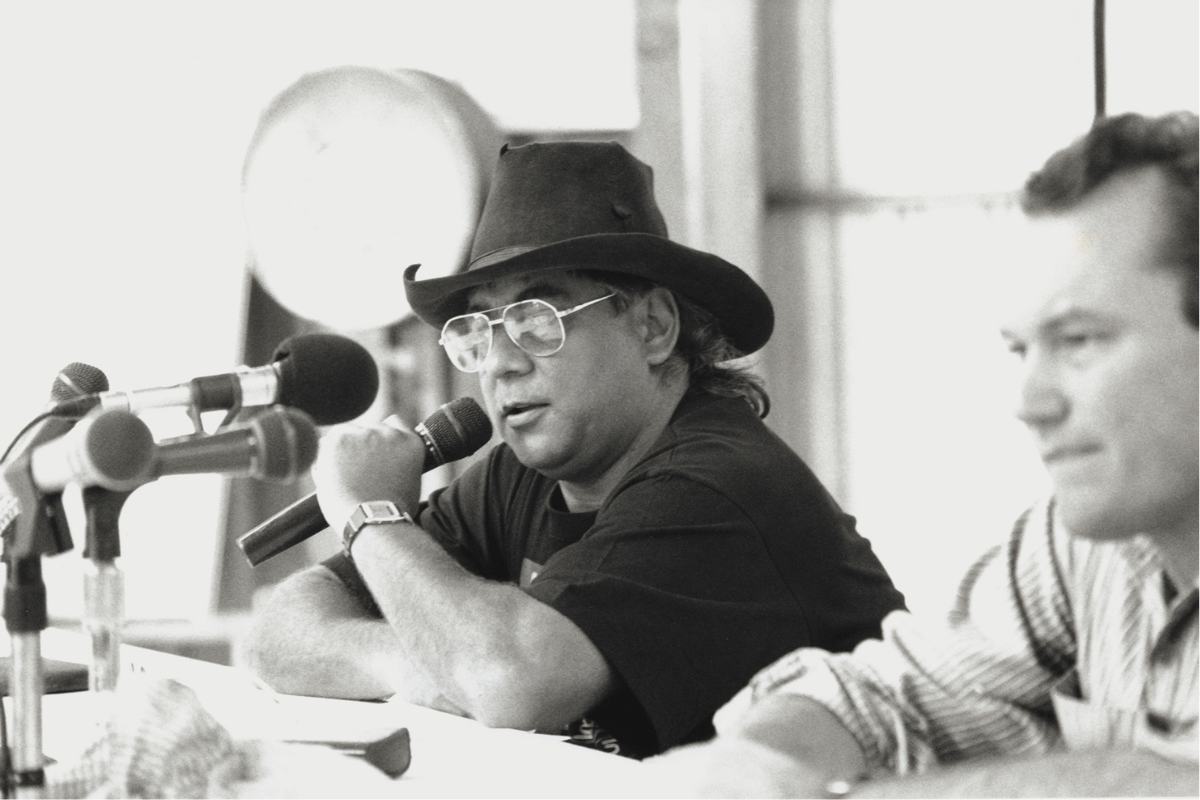You can search for courses, events, people, and anything else.
Aboriginal and Torres Strait Islander peoples should be aware that this story contains the images and names of people who have passed away.
"An absolute force of life," is how Distinguished Professor Alexis Wright describes her longtime friend, Tracker Tilmouth, the visionary leader in building Aboriginal economies who is the subject of her 2018 book, Tracker, which won the Stella Prize. An Eastern Arrernte man, Kwementyaye ‘Tracker’ Tilmouth was born in 1954 in Alice Springs. Part of the Stolen Generation, Tilmouth was taken from his family and raised at the Croker Island Mission. He later went from working as a stockman in central Australia to striding down the hallways of Parliament House to argue in favour of land rights, native title rights, and Aboriginal self determination.
In 2015, then aged 62, Tilmouth died from heart and cancer complications, leaving a chasm in the lives of his family and friends, including Wright, who was then busy writing the book the two had envisaged together.
Wright is a professor in creative writing at Western Sydney University, as well as a Miles Franklin award winning novelist, and was recently awarded the Creative Australia Inaugural Lifetime Achievement Award in Literature. When she started to consider how best to tell Tracker’s story, she quickly ruled out a traditional biographical approach.
Instead, she decided on a 'collective memoir' and spoke to and recorded the recollections of approximately 50 people who had been suggested by Tilmouth.
CONSENSUS CULTURE
The idea of consensus — of everyone discussing issues to come to an agreement — is strongly rooted in the Aboriginal culture, explains Wright, a member of the Waanyi nation of the Gulf of Carpentaria. "It has been our way of doing things in our culture for forever and a day."
Tracker takes this approach; "It’s a book of consensus of what people had to say about Tracker Tilmouth. About his work, his ideas, his vision, his humour, and his ability to astound you on a regular basis," she explains.
"Tracker never wrote anything down," says Wright. "But through writing this memoir, I realised that his filing cabinet, his archives, were in other people’s minds, in the work that he did with them."
Following its release, Tracker was highly acclaimed in literary circles. The judges' report for the Stella Prize, a major literary award celebrating Australian women’s writing, described it as "one man’s story told by many voices, almost operatic in scale."
But perhaps more importantly, it was embraced by the Aboriginal community. "After this book came out, a lot of Aboriginal people said there should be a Tracker Tilmouth University built about his ideas and vision," says Wright. "In a way, I feel that this book is Tracker’s University."
Wright’s work has had global impact, with her books translated into Chinese, French, Italian and Polish. She was even contacted by university students in China’s province of Inner Mongolia who were keen to translate Tracker into Mongolian.
Need to know
- Western’s Alexis Wright wrote a collective memoir about Tracker Tilmouth, a celebrated Indigenous activist.
- She won the 2018 Stella Prize for it.
- Tracker is being published in the UK.
"One man's story told by many voices, almost operatic in scale."
EMBRACING CHALLENGE
Now, Tracker is set to find a new audience in the UK — alongside Wright’s newest novel, Praiseworthy (which won the 2024 Stella Prize), it is soon to be published by independent publisher: And Other Stories.
"Tracker is astounding and couldn’t be more relevant in the UK. Britain is often disengaged from the long-term impacts of colonialism in its former colonies, and Tracker brings home the stakes in a moving and engaging way," says Tara Tobler, senior fiction editor at And Other Stories. "It’s a testament to the wit, intelligence, boundless energy, survival drive and sheer strategic genius of a man who, according to the genocidal-colonial project, shouldn’t have been here at all. Yet here he is, in the centre of the old empire, winking and laughing at us from every page, oceans away from Country but standing up for it all the same. I also think Tracker has a lot to teach us about how collaborative authorship and collective storytelling can work on the page. Like everything by Alexis Wright, it’s an absolute marvel. I couldn’t be prouder to publish it."
Wright believes the world is increasingly embracing Australian literature, and people are excited about it. However, she acknowledges there is a lot for Australian writers to deal with in this time of extreme climate change and global unrest.
"They need to keep up with what’s happening in the world and look at the broader picture, and to be able to write the sort of stories that are required, at this time and into the future," she says.
She also notes that readers have a significant role to play, by being open to feeling challenged by literature, adding: "We need people to love literature as much as they love sports in this country."
Meet the Academic | Distinguished Professor Alexis Wright
Alexis Wright is a member of the Waanyi nation of the southern highlands of the Gulf of Carpentaria. The author of the prize-winning novels Carpentaria and The Swan Book, Wright has published three works of non-fiction: Take Power, an oral history of the Central Land Council; Grog War, a study of alcohol abuse in the Northern Territory; and Tracker, an award-winning collective memoir of Aboriginal leader, Tracker Tilmouth. Her books have been published widely overseas, including in China, the US, the UK, Italy, France and Poland. She held the position of Boisbouvier Chair in Australian Literature at the University of Melbourne between 2017–2022. Wright is the only author to win both the Miles Franklin Award (in 2007 for Carpentaria) and the Stella Prize (in 2018 for Tracker). Her latest novel Praiseworthy, received the Queensland Literary Award for Fiction in 2023 and won the Stella Prize in 2024. She is the inaugural winner of the Creative Australia Award for Lifetime Achievement in Literature. She is a Professorial Fellow at the Writing and Society Research Centre.
Credit
Future-Makers is published for Western Sydney University by Nature Research Custom Media, part of Springer Nature.
© gruffi/iStock/Getty; Cover illustration by Ben Juers
© Johan Mouchet on Unsplash





